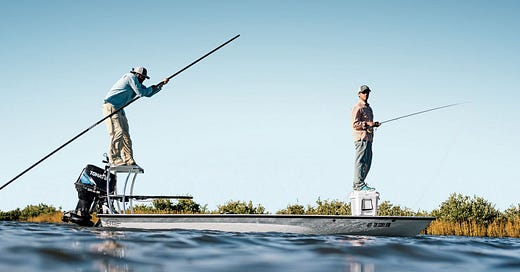In 2006, brothers Roy and Ryan Seiders founded YETI with the goal of creating a lifestyle business. Today, YETI boasts $1.6 billion in revenue.
Before YETI, Roy and Ryan were already seasoned entrepreneurs. Roy built custom boats, while Ryan crafted fishing rods. The idea for YETI emerged during a fishing trip off the Texas coast, where they found their boat’s coolers inadequate for the harsh conditions and not sturdy enough to stand on while casting.
Determined to create a better cooler, they drew on their entrepreneurial upbringing. Their father, Roger Seiders, ran a successful niche business selling epoxy for fishing rods and often took them to trade shows, teaching them the ins and outs of small business.
Imbued with this spirit, the brothers found a manufacturer in the Philippines that could produce durable coolers through a process called biaxial rotomolding. Despite the high production cost, which resulted in a retail price of $300—nearly 10 times that of typical coolers—they experienced early success by targeting hardcore hunters and fishermen and hiring influential guides as brand ambassadors. They also included YETI hats and T-shirts with every cooler to foster brand conversation among early customers. In the first year, YETI made around $500,000, already surpassing any previous business the brothers had started.
In 2008, as YETI was gaining traction, their manufacturing partner Ivan was tragically murdered, leaving the company in a precarious position. They responded by raising prices and opening a U.S. manufacturing plant. This diversification allowed them to maintain production despite higher costs. Ivan’s wife eventually took control of the factory, enabling continued offshore supply and dramatically increasing output.
By 2009, the company was generating $5 million in sales largely through word of mouth. Orders surged as they gained traction in major retail stores like Bass Pro Shops and REI. By 2011, sales hit $30 million, with retailers requesting more inventory to keep up with demand.
To scale quickly, YETI sold a 67% stake to private equity firm Cortec for $67 million in 2012. Cortec helped improve operating efficiency and recommended a second manufacturer in the Midwest to increase delivery speeds and give YETI greater control over its manufacturing process. By 2014, revenue had soared to $147 million as the brand expanded its reach to new audiences, like rural feed-and-seed stores, appealing to farmers and ranchers who enjoy outdoor activities and barbecuing. YETI was no longer just a brand for hardcore outdoors people—it became a go-to brand for anyone who does anything outdoors.
In 2015, Ryan received a vacuum-insulated bottle as a gift. After testing it out, he threw it on Roy’s desk and said it was incredible. A month later, Roy had designed his own 20 oz and 30 oz cups. The brothers felt they had the brand and distribution to succeed with another product. Despite initial skepticism from the board, the YETI Rambler was born. They sold $150 million worth of cups that year. Rambler cup sales equaled cooler sales in only the first year of launch, doubling the size of the company practically overnight. YETI became the must-have brand in the outdoor space, with sales skyrocketing to $450 million. This growth was fueled by the company’s ability to evolve into a sophisticated sales and marketing organization and diversify its product offerings.
YETI eventually IPO’ed in 2018, and as of this writing, is currently worth over $3.26 billion.
The Seiders brothers used the windfall from YETI to buy twin hunting lodges at Paloma Ranch, a seventeen-thousand-acre spread of mostly raw land in far South Texas. With eight young children between their two families, the ranch is often bustling with activity. Days at Paloma start early with hunting parties gearing up in walk-in gun safes and returning to unload their bounty in the deer barn. Afternoons are spent by the pool and outdoor lounge area, enjoying the southeast winds, with some guests shooting trap at the nearby platform. Evenings culminate with family meals at a fourteen-person outdoor dining table, followed by drinks around the firepit and planning the next day's hunt.
For the Seiders brothers, Paloma Ranch is their version of paradise. Growing up hunting in the Texas Hill Country, they now relish managing their expansive land near the Mexican border. Having sold a controlling interest in YETI, they no longer have day-to-day involvement in the company, allowing them to dedicate their time to managing Paloma Ranch and enjoying their passion for the outdoors.




